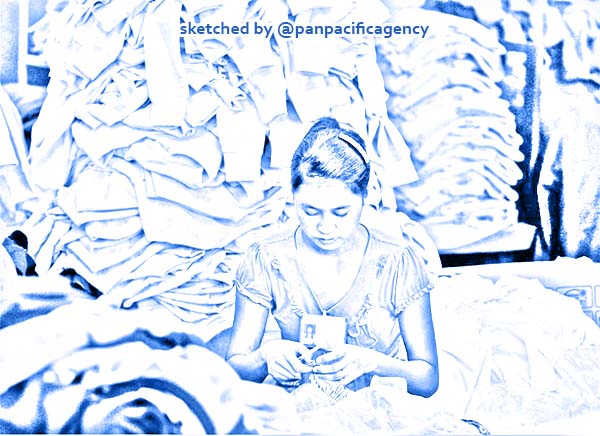Garment factories in Yangon are under shutdown

Myanmar is on track to meet its target of drawing US$10 billion worth of textile exports by 2024, an official from the Myanmar Garment Entrepreneurs Association (MGEA) told state media. Photo: EPA. Sketched by the Pan Pacific Agency.
YANGON, Mar 19, 2020, Myanmar Times. At least 20 out of the 500 factories in Myanmar have shut down, leaving more than 10,000 potentially unemployed as a result of COVID-19. Most of the factories are in the garment manufacturing sector. Due to disruptions in the raw material supply chain from China since January, 15 factories have permanently ceased operations, while another five have stopped operating temporarily. Others have reduced the number of workers at their facilities, Myanmar Times reported.
Not all the laid off workers have been compensated. There are factory owners who have simply refused to pay wages. These include Su Xing (Myanmar) Garment Co. Ltd and Myanmar Royal Apollo, whose owners are nowhere to be found.
The two factories have a total of 786 workers.
Such businesses will be banned from continuing operations in Myanmar, said U Thant Sin Lwin, secretary of Myanmar Investment Commission (MIC). “It is acceptable if the employers are managing the situation with alternative payments. But those who do adhere to our labour laws will be banned from operating here,” he said.
With some raw materials having entered Myanmar via the Muse border and via cargo plane from Guangzhou recently, some factories have resumed operations. However, only 60 percent of the original workforce have been re-employed for now.
“We are being told the raw materials produced before the Chinese Lunar New Year will be exported to Myanmar from now until May but this will not be 100pc yet. The government should provide support in the mean time,” said U Myint Soe, chair of the Myanmar Garment Association.
So far, materials related to the garment industry are the first priority when receiving clearance at customs. The government will also provide loans with special interest rate to employers to pay wages in cooperation with the UMFCCI, U Myint Soe said. Tax exemptions will also be considered.
“The government will issue loans to factory owners if they don’t have enough money to pay salaries. They can repay later, but we still don’t know how much the government would charge for interest on the loans,” said U Myint Soe.
A monitoring committee has been formed to solve and remedy the impact on the economy as a result of the COVID-19 outbreak. The committee will monitor Yangon Region in particular because it is a major city with a large population and many industries. Of the 1 million workers in the region, at least half are garment factory workers, said U Thant Sin Lwin.